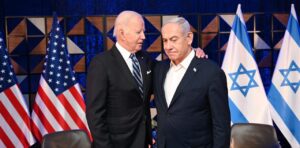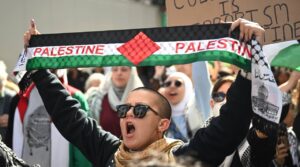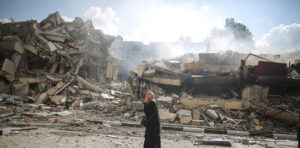Moments after the first images of the Hamas terror attack on October 7 hit the web, people on the Left started to cheer on the brutal assault as an act of “decolonising” Israel. “What did y’all think decolonisation meant?” tweeted one Minnesota-based writer. The massacre of participants at a rave represented a “consequence” for “partying on stolen land”, added a British academic. In the month since, demonstrations across the world have echoed this rhetoric, justifying Hamas’s gruesome actions under the banner of overthrowing the yoke of “settler-colonial” rule.
More than anything, this perspective reflects the common Leftist belief that Palestinians are the true native people of the land, but were dispossessed of their territory by an invading army of white Europeans.
The sudden outburst of anti-colonial rancour, which glorified the slaying of children and innocent civilians, triggered a wave of condemnation, with some pointing out that Jews are also indigenous to the region. “The Jewish people ruled Judean kingdoms and prayed in the Jerusalem Temple for 1,000 years,” observed Simon Sebag Montefiore in The Atlantic. Jews, wrote Rich Lowry in The New York Post, “are fundamentally identified with the land”, making them an “indigenous people”.
Some in Israel take the argument a step further, however. “When Palestinians were climbing trees, we already had a Jewish state,” Naftali Bennett, a former prime minister, argued in a debate with an Arab politician, who had chastised him as a “settler” and a “tumour” that needed to be removed. “There’s no such thing as Palestinians,” declared Israeli Finance Minister Bezalel Smotrich, who claimed that David Ben-Gurion should have “finished the job” and forced out every Arab when the country was founded.
This rhetorical war over which ethnic group maintains authentic and historical ownership of the area between the Mediterranean Sea and the Jordan River speaks to the emotional power of the “indigenous” mantle. In this framework, the justice of a particular cause is determined primarily by whether the people advocating for it are more authentically native. And as a phenomenon, it extends well beyond this conflict, rippling through Western society in recent years. In Europe, for instance, far-Right movements have spent the past decade calling for immigrants to be expelled in order to preserve the racially pure heritage of Europe’s “indigenous” communities. In America, meanwhile, Leftists now demand “land acknowledgment” rituals, which suggest that the US is merely a racist power occupying what should be sovereign tribal territory. During the deadly riots of 2020, activists celebrated the violence as an effort to “decolonise” the country.
Long before October 7, similar disputes defined the politics that shaped relations between Palestinians and Jews. The process, in many respects, is deeply institutionalised.
Last year, I reported from Israel and Palestine, and visited a number of neighbourhoods in East Jerusalem, the largely Palestinian side of the city seized by the Israeli military during the 1967 war. Unlike the West Bank, Israel formally annexed East Jerusalem in 1980, granting Palestinians there permanent residency in Israel, but not Israeli citizenship.
The area is home to the City of David complex — part-museum, part-archeological dig, and part-propaganda apparatus for a project that seeks to exert Jewish claims of indigeneity across all of Jerusalem. The neighbourhoods are like a slow-simmering warzone. Homes are surrounded by razor wire and iron gates. Evictions of Palestinians are celebrated with banners announcing the arrival of Jewish families. The situation is tense.
The excavations and the visitor centre are the project of a group called Elad, also known as the Ir David Foundation, which seeks to increase the Jewish population of Jerusalem to limit Palestinian influence in, and claims to, the city. The project, now funded by billionaires Daniel Loeb and Roman Abramovich, among others, was set up in response to the 1993 Oslo Accords, which floated East Jerusalem as the capital of a Palestinian state. The proposal enraged segments of Israeli society and the bid to uncover artefacts showing Jewish heritage is a direct attempt to subvert Palestinian claims to the city.
“Our aim is to Judaize East Jerusalem,” Yigal Kaufman, a spokesperson for Elad, told The New York Times in 1998. “The City of David is the most ancient core of Jerusalem, and we want it to become a Jewish neighbourhood.” Pamphlets from the group at the time openly touted the archeological dig as the “main public diplomacy body in the arena of the battle for Jerusalem”.
When I visited, our guide explained that artefacts had been found from the Biblical era, even though the dig was yet to uncover any conclusive evidence that it was the home of King David of the Old Testament. Then, about 30 minutes into the tour, the talk turned explicitly political.
“As a Jew, as a Zionist, Jerusalem for us is not a narrative,” said James Elgrod, a British-born Israeli. “It’s not just a place — it’s the essence of our identity for 2,000 years.” He flashed a grainy black-and-white photograph from the early 20th century that showed the surrounding Palestinian neighbourhood without many buildings. “Potato fields, no houses over here,” he said, adding that the mostly Arab-Muslim inhabitants had only moved to the city “60, 70, maybe 80 years ago”. In effect, Elgrod, and the broader Elad project, were hoping to use a collection of calcified pots and old coins to justify efforts to remove Palestinians from the area.
Less subtly, Elad has spent years litigating to evict Palestinian families from homes in the Silwan neighbourhood, just outside the gates of its visitor centre. Elsewhere, according to the Jerusalem-based human rights group Ir Amin, an academic from the University of Haifa reported identifying a discovery at the City of David site as Byzantine in origin, only to be dismissed by Elad’s staffers, who insisted that the discovery was related to stories from the Bible.
A less politicised view of archeology, however, reveals a richer, more complex tale. Jerusalem is filled with artefacts that testify to its diversity, a place once inhabited by dozens of ethnic groups and tribes, a city of ancient empires and kingdoms and multiple religions. Stand at the centre of the City of David, look up, and you’ll see Ottoman Empire-built walls encircling the holiest sites of Christianity, Islam and Judaism. Like the history of virtually every civilisation, the land fought over today is filled with cycles of migration and conquest, with various groups of people settling and blending with others.
Rafi Greenberg, a professor of archaeology at Tel Aviv University, told me that he no longer participates in any of the City of David digs, viewing the entire effort as an attempt to use archeology as a “weapon” to divide the people of Jerusalem. “Palestinians are entirely free to adopt any or all or none of the heritage of the land that they inhabit,” Greenberg said. “One person’s subjective view of the nature of their heritage cannot determine another’s and has no legal or moral implications for that or any other person’s human or civil rights.”
Another way to view the Israel-Palestine conflict — one that is more difficult to politicise — is to look at genetics. According to a 2020 study by a team of researchers at Harvard University and Tel Aviv University, most of the Palestinian-Arab and Jewish populations of the region share a common ancestry that stretches back to the ancient Canaanites, who occupied the territory around 4,000 years ago. Palestinians share about 80% of their ancestry with ancient Bronze Age communities of the Levant, while Iranian Jews share 90% and Ashkenazi Jews have roughly 60-70% of common ancestors.
The findings match earlier studies that show immense genetic overlap between Arabs and Jews in the country, which suggest much of the Palestinian population is descended from ancient Jews and other ethnic groups native to Israel. In that sense, archeological warfare is meaningless: the artefacts represent a shared heritage for all of Israel-Palestine’s residents, not a dividing line to justify expulsions by Israeli settlers or terror attacks by Hamas.
The divisions today, around religion and ethnicity, form a chasm that is exploited by extremists. The coloniser-indigenous arguments are little more than rhetorical devices designed to dehumanise and displace the other. A more productive narrative would recognise the common bonds that unite every Arab and Jew as members of the same community with inalienable rights.
Disclaimer
Some of the posts we share are controversial and we do not necessarily agree with them in the whole extend. Sometimes we agree with the content or part of it but we do not agree with the narration or language. Nevertheless we find them somehow interesting, valuable and/or informative or we share them, because we strongly believe in freedom of speech, free press and journalism. We strongly encourage you to have a critical approach to all the content, do your own research and analysis to build your own opinion.
We would be glad to have your feedback.
Source: UnHerd Read the original article here: https://unherd.com/




